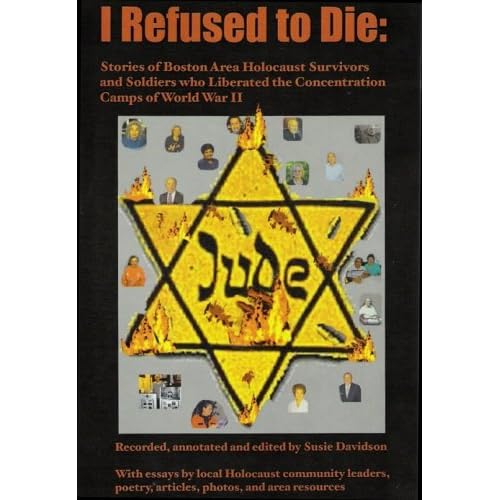
On the evening of May 17th, after my stroll through Boston City Hall, I attended a reading for Susie Davidson's anthology, I Refused to Die at McIntyre & Moore Booksellers in Davis Square. The book is a collection of essays oral histories by Holocaust survivors and camp liberators living in the Boston metropolitan area.
Typically, Davidson's appearances are with Kovno ghetto survivor, Rosian Zerner, and Dachau camp liberator, Cranston "Chan" Rogers. Zerner was unable to attend that evening and Rogers was running late, so Davidson spent time describing the process of putting together the book, (which included a cross country trip on a Greyhound bus to organize her assembled notes without the distraction of home) and read excerpts from the tales of other survivors. In addition, as the book also includes contributions from local poets, she asked Rafael Woolf and me to read. Woolf's poem was a polemic directed at Holocaust denier, Bradley Smith.
Because there are so many accounts of great literary merit written by actual survivors and I am not a trained historian, I have thus far avoided writing directly on the subject, but this sublimation appears to manifests itself in confronting theological anti-Judaism, exposing Holocaust denial, such as the play I am currently developing. Somehow, in the process, I've also written a couple of poems.
The first, "Numbers" is one I wrote because I had been invited to participate in a poetry reading at The New England Holocaust Memorial for no particular reason beyond the fact that I am Jewish. It was in memory of a cousin of mine who had survived Auschwitz-Birkenau. I long considered it an act of pretentiousness on my part, so I read it so infrequently, but editors keep asking permission to reprint it, so I must be the one in error. The second is entitled "Metathesis of the Books" and was inspired by a series of paintings by Samuel Bak, a child survivor of the Vilna ghetto, whose allegorical works have inspired me for many years.
Chan Rogers, a native of Florida, arrived and spoke informally in a gravelly Southern accent about his experiences as a sergeant in the 45th Infantry Division often taking questions. After the war, he went on to study at MIT and became a civil engineer who designed many features in the Boston area including the Cambridge Street underpass that goes under the Harvard University campus. He explained that he and other veterans never spoke much about their World War II experiences for years since after the war, so many of them ended up going to school and working with other men who had had similar experiences, and it was a matter of passing these stories on to other generations that has caused him to speak.
Rogers spoke of April 29, 1945, the day when 45th Thunderbird Division entered the Dachau concentration camp by way of a railroad bridge after a surrender had been arranged by the Red Cross. (In 2001 I was present to hear a friendly disagreement between a veteran of the 45th and one from the 42nd Rainbow Division over whose division was the first into Dachau as the 42nd had entered the camp from the other direction.) Rogers explained that while he had already seen much carnage already in the war, he was unprepared for Dachau, having only been told that it was a prison where "Hitler kept his enemies." Senior SS officers had abandoned the camp in advance of the surrender, leaving their underlings to be captured by advancing American forces.
He also made mention of the Dachau massacre that occurred that day after troops from both the 45th and 42nd discovered not only the starvation, disease, and overcrowding of the 32,000 prisoners, but thousands of corpses, including the 39 rail cars each filled with over 100 bodies. Rogers' own research indicates that trains had come from the Buchenwald concentration camp and that the prisoners had died primarily of starvation having been shipped out without food in advance of American troops who liberated the camp on April 11th. The Dachau massacre resulted in the death of 35 captured SS "Death's Head" guards, for which several American soldiers faced court-martial, though General Patton decided they deserved no further punishment.
Rogers made a number of parallels to current events, most notably the recent Holocaust denial conference hosted by Mahmoud Ahmadinejad, noting that the deniers' agenda in this particular was clearly to de-legitimize Israel's right to exist.
Given the informality of the event Rogers also recounted a number of anecdotes, including an encounter with the daughter of German-American Bund leader, Fritz Kuhn, who taunted Rogers and his troops with threats that the German Army would return to rout the Americans out. He grinned as he quipped, "That never happened."
Friday, May 18, 2007
May 17th: "I Refused to Die" Reading at McIntyre and Moore
Posted by
Ian Thal
at
9:46 AM
![]()
![]()
Labels: Antisemitism, Dachau, Davis Square, genocide, Holocaust Denial, poetry, Samuel Bak, Somerville Massachusetts, Susie Davidson, World War II
Subscribe to:
Post Comments (Atom)



2 comments:
Chan Rogers wrote in to note that he has been lecturing on the liberation of Dachau Concentration Camp since before the publication of I Refused to Die and still does so on his own-- often with a PowerPoint presentation.
As I mentioned here, "Numbers," despite my own uneasiness with it was reprinted yet again, this time in the online journal, Spoonful.
Post a Comment